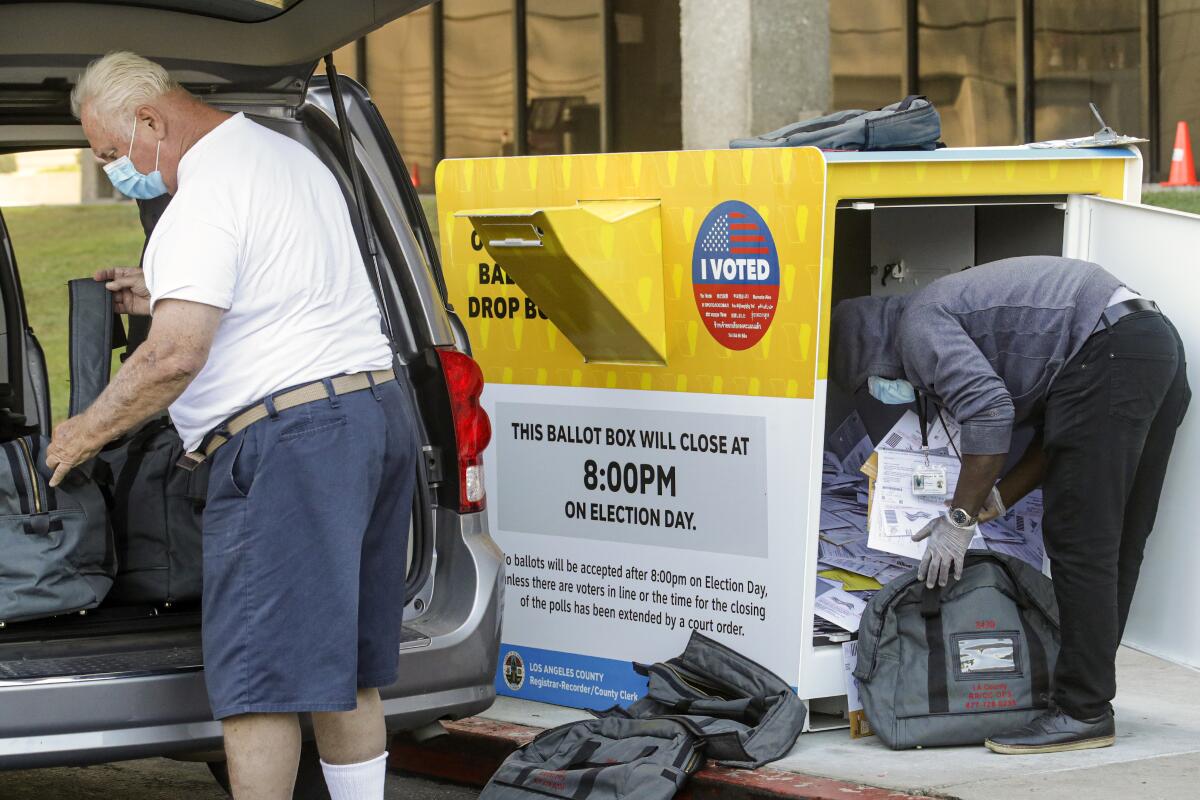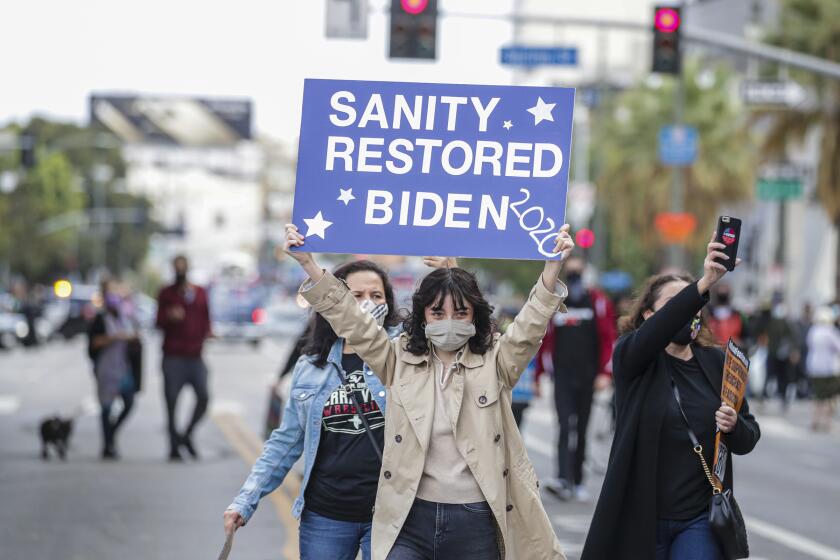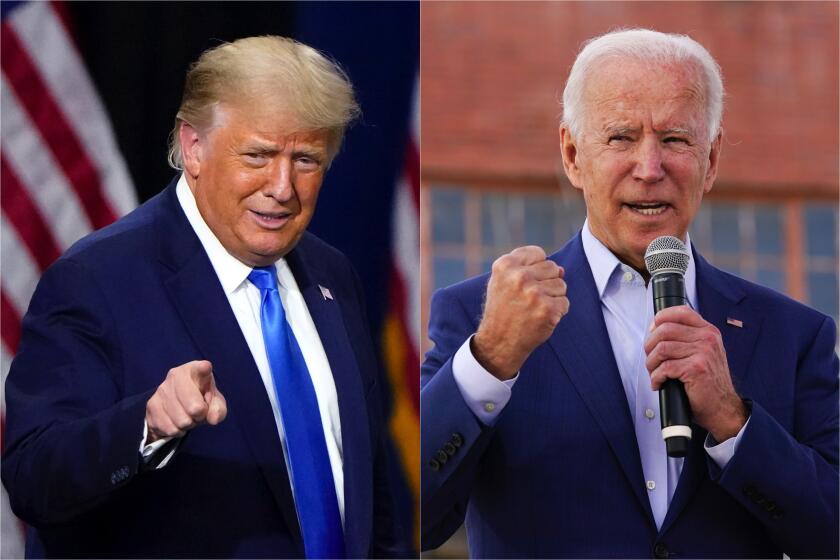Column: Expanding vote by mail in California was a success. Let’s do it permanently

- Share via
SACRAMENTO — The pandemic produced one good thing: mail ballots for every California voter. And regardless of our fired president’s nonsensical claims, they were cast without a scent of fraud.
That was anticipated based on the history of clean mail balloting. And it was forecast by practically everyone except pugnacious President Trump and his Republican lemmings.
Regardless of their moaning about potential corruption, Republicans actually came out ahead in much of the California voting. They picked up some congressional seats and beat back a few Democratic ballot measures.
Virus or no virus, California should continue to send every active registered voter a mail ballot in future elections. It makes voting much easier. And there are plenty of protections against fraud.
Here’s another thought about the Nov. 3 election:
It’s hard enough for voters to figure out what most of the ballot propositions would do without the state attorney general dishing out party propaganda in the official labels, titles and summaries.
The job of writing the official ballot descriptions should be turned over to a neutral noncombatant such as the nonpartisan state Legislative Analyst’s Office. Give the voters a break. Play it straight.
More later on ballot measure descriptions.
Let’s salute California’s voting system that appears to have worked smoothly.
In California, unlike battleground Pennsylvania, counties were allowed to begin tabulating mail ballots as soon as they were returned to the registrar of voters. The results were not released until polls closed on election day. But vote counters got a huge head start.
One feature that worked great was a tracking system that permitted voters — if they signed up for it — to follow their ballots. I got an email a week before election day telling me that my ballot had not yet arrived. That’s because I hadn’t voted. After I did vote, I got another email informing me the ballot had been received and would be counted.
That was comforting to know.
Gov. Gavin Newsom decided on his own — and the Legislature later passed a law to make sure it was legal — that every active registered voter would receive a mail ballot. The stated idea was to allow people to cast ballots without crowding into vote centers during the COVID-19 pandemic.
On Saturday, the song would have been perfect for Democrats and much of America celebrating now President-elect Joe Biden and Vice President-elect Kamala Harris.
Of course, Democrats also knew they’re always helped by large turnouts.
And it was a very large turnout — perhaps around 80% of the record 22 million registered voters when all the counting is completed.
Of all the votes recorded, probably 85% were cast with mail ballots, estimates Paul Mitchell, vice president of Political Data Inc., the go-to source for election number analysis.
Mail ballots have caught on big-time in California. Twenty years ago, a quarter of the general election vote was cast by mail ballot. By 2010, it was up to nearly half. By 2018, it had grown to 65%. And in the March primary it was 72%.
“Once they’ve gotten a taste of vote-by-mail, they’ve wanted more,” says Sam Mahood, spokesman for Secretary of State Alex Padilla. “They like the flexibility.”
Newsom and Padilla indicate they’d like to permanently send mail ballots to all registered voters.
“Making voting easier, providing more choice and more opportunity is fabulous,” the governor said on election day.
Assemblyman Marc Berman (D-Menlo Park), chairman of the Assembly elections committee, announced he’ll introduce legislation to mail every voter a ballot.
“Our democracy is strongest when everyone participates,” he said.
Right. And it’s also strongest when voters get unbiased information about ballot propositions from the state attorney general.
State law requires the attorney general to provide an “impartial statement of the purpose of the measure” in language unlikely “to create prejudice for or against” the proposal.
That was adhered to by attorneys general of both parties until the 1990s. Then some slanting started showing up and it got increasingly worse, especially under Atty. Gen. Kamala Harris, now the vice president-elect.
This country was great until President Trump was elected, running on a once-inconceivable demagogic message that the USA’s days of greatness were behind her. He then steadily proceeded to prove his claim, fracturing the nation and sullying its image overseas.
Atty. Gen. Xavier Becerra — clearly feeling pressure from labor and his Democratic Party — has sunk to a new low.
For example, the ballot label on Proposition 15: “Increases funding sources for public schools, community colleges and local government services by changing tax assessment of commercial and industrial property.”
Changing tax assessment? What it did was change Proposition 13 and substantially raise commercial property taxes. Voters understood and voted no.
There were similarly slanted descriptions that favored Proposition 16, which would have allowed race and gender preferences in public university admissions and government contracting (the measure failed) and opposed Proposition 22 to allow drivers for ride-hail and delivery companies to be classified as independent contractors instead of employees (it passed).
Judges have all but stopped enforcing the law, deferring to the attorney general.
“The court is not a copy editor,” Sacramento County Superior Court Judge Laurie M. Earl wrote in August while announcing her intention to slap down three lawsuits challenging the wording of proposition titles.
“Any AG has a blank check to say whatever he or she wants to say,” asserts Steve Merksamer, a political attorney who estimates he has lawyered roughly 150 ballot propositions. He was also once a top aide to Republican Atty. Gen. George Deukmejian and later Deukmejian’s gubernatorial chief of staff.
“Unfortunately, this makes voters even more cynical than they already are,” adds Merksamer, the attorney for Proposition 22.
Becerra and voters would be better off if a nonpartisan outfit wrote the official descriptions for ballot measures.
But the Legislature is unlikely to ever agree. So, this would require a ballot initiative — one that was honestly described to voters.
There are times when politics should be taken out of elections.
Sign up for Essential California
The most important California stories and recommendations in your inbox every morning.
You may occasionally receive promotional content from the Los Angeles Times.










